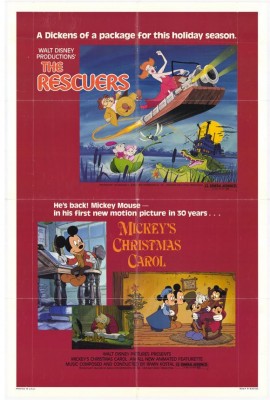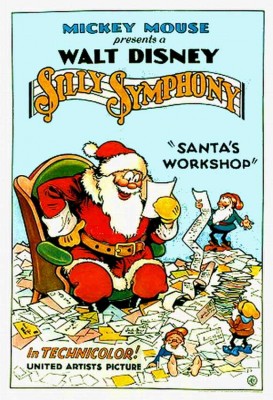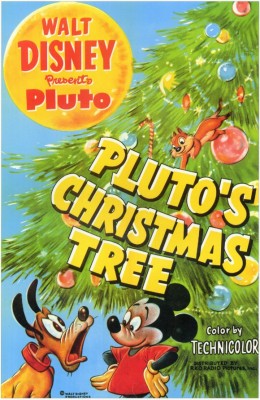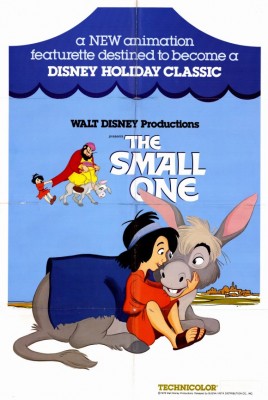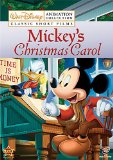| Reviews & Columns |
|
Reviews DVD TV on DVD Blu-ray 4K UHD International DVDs In Theaters Reviews by Studio Video Games Features Collector Series DVDs Easter Egg Database Interviews DVD Talk Radio Feature Articles Columns Anime Talk DVD Savant Horror DVDs The M.O.D. Squad Art House HD Talk Silent DVD
|
DVD Talk Forum |
|
|
| Resources |
|
DVD Price Search Customer Service #'s RCE Info Links |
|
Columns
|
|
|
Disney Animation Collection 7: Mickey's Christmas Carol
Though not a bad little disc to show to the kids over the holidays, the four cartoons - spanning several generations and animation styles - vary greatly in quality while The Small One and Santa's Workshop cull singularly inferior and altered masters, shorts pointlessly altered in the name of political-correctedness.
Mickey's Christmas Carol was a Big Deal when it was new. For one thing, Mickey Mouse hadn't appeared in any theatrical shorts since 1953's The Simple Things, and the show's all-cartoon-star cast featured myriad characters not seen in years. In this sense it anticipates subsequent all-star revival projects like Who Framed Roger Rabbit (1988) and Space Jam (1996), to name two high-concept examples. (Conversely, this was the last Disney film released under the Buena Vista distribution banner.)
The basic idea is a good one, "casting" Disney's cartoon players in a loose adaptation of Charles Dickens's A Christmas Carol, with (Uncle) Scrooge McDuck as Ebenezer Scrooge, Mickey Mouse as Bob Cratchit, and Donald Duck as Ebenezer's nephew. Also in the cast: Goofy as an unusually clumsy Jacob Marley, Jiminy Cricket as the Ghost of Christmas Past, Mr. Toad as Fezziwig, and Minnie Mouse as Mrs. Cratchit. Even the "extras" are played by familiar Disney characters.
The 24-minute short was suggested by an earlier Disney record album adaptation co-written by actor Alan Young (The Time Machine, Mister Ed), who also provides the voice of Uncle Scrooge in both the record and the movie. Young gets co-story credit here, and has voiced Uncle Scrooge in various movies, TV shows, and even video games ever since. (Young, incidentally, celebrates his 90th birthday next month.)
The film itself is pleasant and appropriately atmospheric, with sepia-toned opening credits and evocative 19th century London backgrounds. Most of the roles are well cast by Disney's characters, with Scrooge, Donald (voiced for the last time by Clarence "Ducky" Nash), and Mickey fitting in especially nicely, and, as with Roger Rabbit, there seems to have been some effort to give the characters a kind of late-1940s look rather than try to update them to early-1980s designs, which in turn provides the short an agreeable timeless quality.
Its biggest problem is in trying to cram Dickens's novella in less than half-an-hour; it's unfortunate Disney didn't produce a more leisurely 65-70-minute version. Characters and situations come and go far too quickly, and in diluting the story down to the barest of exposition what's left may be the talkiest Disney short in history, with Scrooge, Mickey, et. al., racing through Disney-adjusted Dickens ("I'll tell you what Christmas is," Scrooge says, "It's just another work day, and any jackanape who thinks else should be boiled in his own pudding!") The result of all this CliffsNoting is that the story has none of the emotional impact it clearly wants to have. Still, it was pleasantly received when it was released with a 1983 reissue of The Rescuers (1977).
The other shorts are a strange mishmash. Santa's Workshop was an early Silly Symphony in Technicolor, but pretty indistinguishable from other generic musical shorts made by Max and Dave Fleischer, Van Beuren, etc., during this same period.
Pluto's Christmas Tree, the penultimate regular Mickey Mouse cartoon, is typical of Disney's one-reel characters from about 1940 onward: good character animation, but overall mechanical and unmemorable. This is one of myriad Pluto vs. Chip & Dale shorts, where Mickey, as Pluto's exasperated owner, scolds the poor pooch, blaming him for the rodents' misdeeds. Mickey has a particularly ugly design in this one while other Disney characters make a cameo appearance at the end.
The studio cut way back on its shorts during the mid-1950s; by then the costs of each six-minute short had shot up to around $75,000 and they just weren't making money. The company made 17 shorts in 1952, four in 1955, and just one in 1958. During the whole of the 1970s Disney made just two: the hugely popular Winnie the Pooh and Tigger Too! (1974) and The Lost One (1978), which seems curiously, unjustly forgotten.
A real anomaly among Disney's short cartoons, this 26-minute short, adapted from Charles Tazewell's children's book, was one of the studio's few overtly religious films, and stylistically it looks less like Disney than the work of its director, soon-to-go-independent Don Bluth. The simple but powerful story is about a young Judean boy forced by his father to sell a beloved but weak old donkey. Only the local tanner is willing to buy the beast until, at the very end, Joseph buys the animal to carry Mary to Bethlehem.
The intelligent simplicity of the story and the beautiful character animation showing the great affection the boy and beast have for one another are the keys to its success. It's powerful stuff because the animation expertly expresses a lot of emotion in a minimal amount of screen time. Voice characterizations are unencumbered by star names driving their personalities (the norm for Disney's features by then) and the good musical score and songs are unobtrusive. Some comedy relief in the middle seems unnecessary, but it doesn't adversely affect the emotional wallop of the finale.
Video & Audio
Disney is almost like two different companies. For film and animation buffs, their Blu-ray and "Walt Disney Treasures" releases are generally wonderful, while titles like this - the kind of thing typically found in the checkout line at Wal-Mart - are almost junky by comparison.
Even though Mickey's Christmas Carol had been remastered in widescreen for its Mickey Mouse in Color release a while ago, what's here is an older but otherwise okay full frame transfer. Pluto's Christmas Tree looks great, practically flawless, but Santa's Workshop looks terrible with lots of artifacting; it's not much better than a public domain release. The reason for this seems to be due to Disney's use of a censored master deleting a few seconds of alleged black stereotyping. The Small One's similarly weak (and full-frame) transfer second-guesses public reaction in other ways, downplaying the Christian angle with a redrawn Star of Bethlehem (adjusted to look less like a cross) and altered song lyrics sung by Jewish merchants who here sing "we just work a little harder if we must" instead of "we simply cheat a little if we must." Oy vey! Audio is Dolby Digital mono and Surround Sound, with optional English, French, and Spanish subtitles.
Extra Features
The only extra to speak of (and it barely so) is what's called a "Collectible Litho Print" but what in actuality is a color picture from Mickey's Christmas Carol on plain card stock, the kind of inserts companies like Image and Blue Underground used to include without making a big deal about it.
Parting Thoughts
Though not a bad DVD to run for the kids at Christmastime, Walt Disney Animation Collection Volume 7 feels slapped together without much thought or regard for the transfers, and that it's essentially a reissue of an older release designed to make more money off of previously released material. Unenthusiastically Recommended.
Stuart Galbraith IV's latest audio commentary, part of AnimEigo's forthcoming Tora-san DVD boxed set, is available for pre-order, while his latest book, Japanese Cinema, is in bookstores now.
|
| Popular Reviews |
| Sponsored Links |
|
|
| Sponsored Links |
|
|
| Release List | Reviews | Shop | Newsletter | Forum | DVD Giveaways | Blu-Ray | Advertise |
|
Copyright 2024 DVDTalk.com All Rights Reserved. Legal Info, Privacy Policy, Terms of Use,
Manage Preferences,
Your Privacy Choices | |||||||









